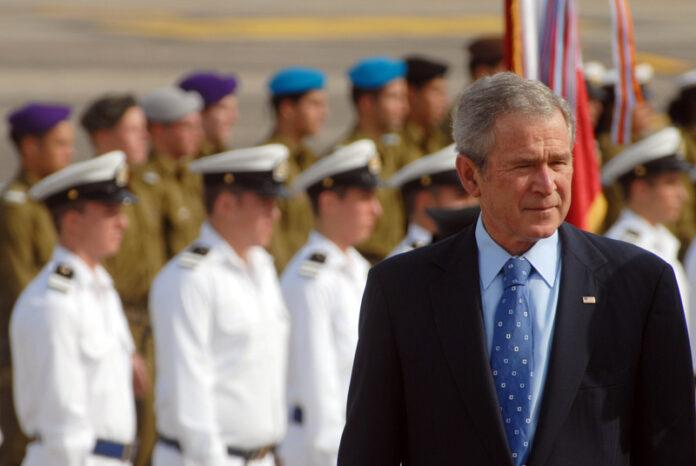Former President George W. Bush has chosen not to endorse any candidate in the upcoming 2024 presidential election. This decision comes amidst a politically charged atmosphere, with other prominent Republicans taking varied stances on the race.
Bush’s office released a statement to NBC News: “President Bush retired from presidential politics years ago.” This brief comment encapsulates the 43rd President’s current stance on electoral engagement, continuing his recent approach to presidential contests.
Bush’s choice not to endorse differs markedly from the stance taken by his former Vice President, Dick Cheney. In an unexpected decision, Cheney declared his support for the Democratic nominee, Vice President Kamala Harris, in the forthcoming election. Cheney’s explanation for this choice was clear and forceful. He asserted that Donald Trump poses an unprecedented danger to the American Republic, accusing him of attempting to unlawfully retain power after losing the previous election through deception and violent means. Cheney emphatically stated that Trump should never again be entrusted with a position of authority.
This is not the first time former President George Bush has abstained from making a presidential endorsement. In the 2020 election, he similarly refrained from publicly supporting any candidate. It was later revealed in an interview with People magazine that Bush had written in the name of Condoleezza Rice, his former Secretary of State, on his ballot. In the 2016 election, Bush’s spokesperson confirmed that the former president had left the presidential section of his ballot blank.
Bush’s approach to presidential politics has evolved since leaving office. During his post-presidency, he endorsed Republican nominees John McCain in 2008 and Mitt Romney in 2012. However, he has not attended a Republican National Convention since 2004, when he was the incumbent President seeking re-election. His last appearance at a convention was in 2008 when he spoke remotely from the White House.
The former President’s decision not to endorse comes as the Republican Party struggles with internal divisions and the continued influence of former President Donald Trump. As of July 2024, most currently serving Republican senators and representatives have endorsed Trump’s 2024 campaign. This includes 42 out of 49 Republican senators and 192 out of 220 Republican representatives.
Among the notable Republican figures who have endorsed Trump are Senate Minority Leader Mitch McConnell, Senators Ted Cruz and Lindsey Graham, and Representatives Steve Scalise and Jim Jordan. At the state level, 25 of 27 incumbent Republican governors have endorsed Trump’s presidential bid.
However, Bush is not alone in his decision to refrain from endorsing. Of the living GOP presidential and vice presidential nominees, only Sarah Palin, who ran as McCain’s running mate in 2008, has publicly supported Trump for the 2024 race.
On the Democratic side, Vice President Kamala Harris has secured endorsements from various party leaders and officeholders. Senators Elizabeth Warren, Amy Klobuchar, and Tim Kaine have all voiced their support for Harris, as have Governors Gavin Newsom of California and Kathy Hochul of New York.
The 2024 presidential race has also seen some notable cross-party endorsements. In addition to Dick Cheney, several other Republicans have announced their intention to support Harris, including former members of Congress and state legislators. Conversely, a few Democrats, including some former governors and state legislators, have crossed party lines to endorse Trump.
As the 2024 presidential race progresses, the endorsements or decisions to abstain from political figures like George W. Bush are expected to be a focal point of discussion and analysis. While some voice their support loudly, others, like the 43rd President, stay on the sidelines.

